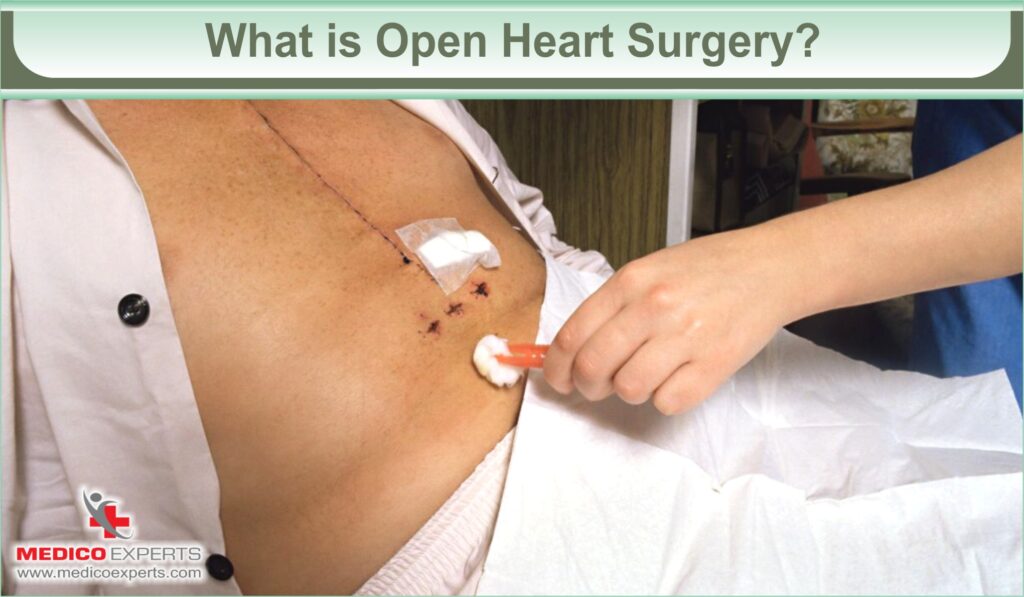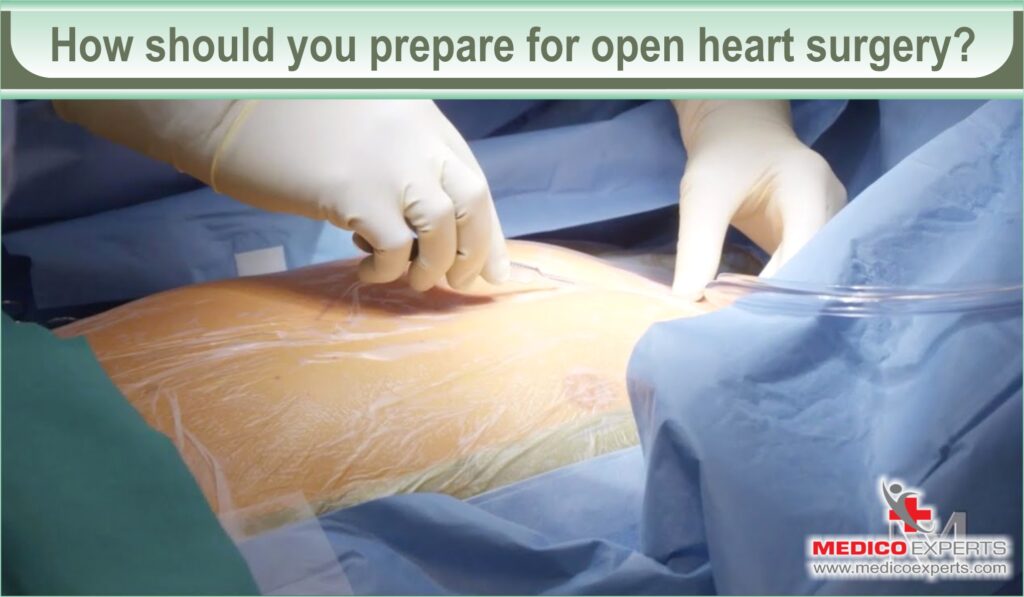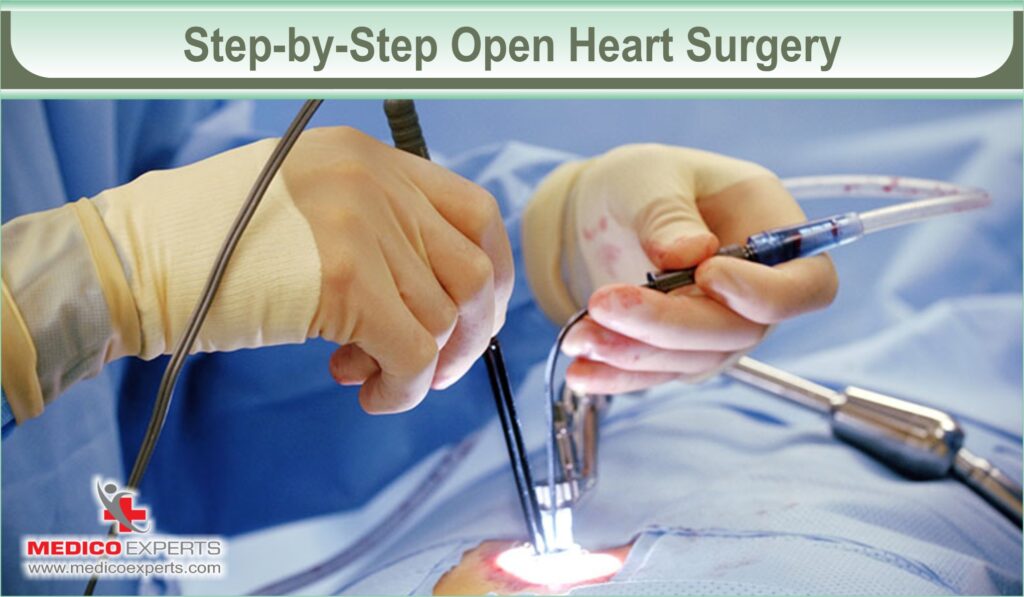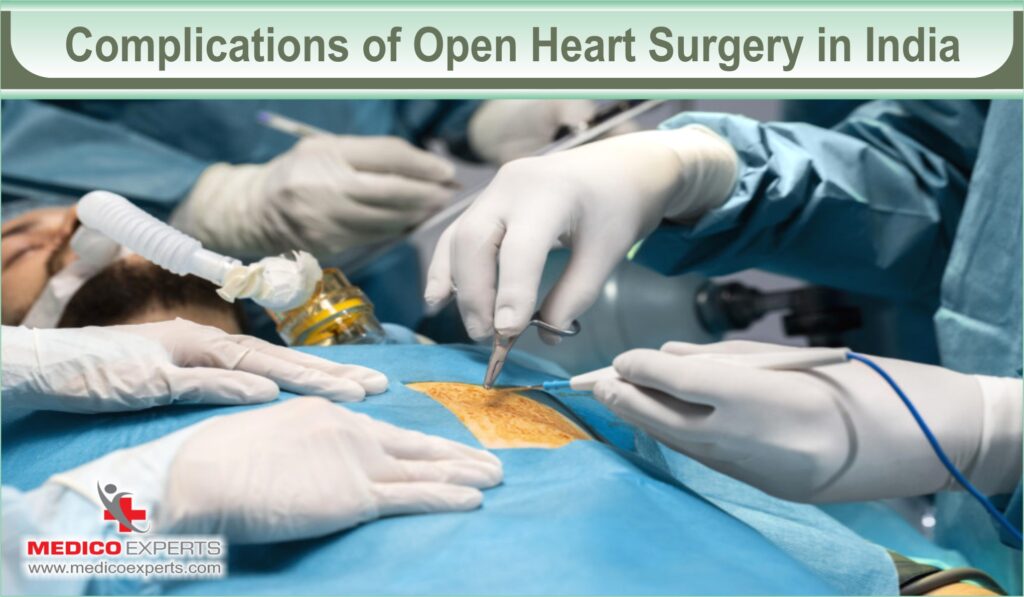In India, it is estimated that over 100,000 open heart surgeries are performed annually. Open heart surgery is a critical intervention for various cardiac conditions, including coronary artery disease and heart valve disorders.
Open heart surgery is important due to its life-saving potential and its ability to treat complex cardiac conditions. Through procedures such as coronary artery bypass grafting (CABG), heart valve replacements, and heart transplants, open heart surgery helps restore the blood flow to the heart, repair damaged heart valves, and allows transplantation of a healthy heart when needed.
With advancements in surgical and medical technology, the success rates of open heart surgeries have significantly improved. For instance, the overall survival rate for coronary artery bypass grafting (CABG) in India is reported to be around 97%, ensuring better outcomes for patients.
Let us now, know in detail about open heart surgery in India
What is Open Heart Surgery?

Open-heart surgery, also known as cardiac surgery, is a surgical procedure that involves accessing the heart through an incision made in the chest. It is performed to treat various heart conditions and involves operating on the heart muscles, valves, arteries, or other structures.
Open-heart surgery is typically performed under general anesthesia, and during the procedure, the patient may be connected to a heart-lung bypass machine, also known as a bypass pump, which takes over the function of the heart and lungs.
The term “open-heart surgery” refers to the fact that the surgeon makes a large incision in the chest, usually through the breastbone (sternum), to access the heart. This allows the surgeon to directly visualize and operate on the heart while it is still beating.
It may be performed for a variety of reasons, including treatment for blocked or narrowed coronary arteries, heart valve repair or replacement, repair of congenital heart defects, heart transplant, or other procedures aimed at treating heart conditions.
How should you prepare for open heart surgery?

You should prevent taking blood thinners and non-steroidal anti-inflammatory drugs as they may cause the prevention of blood clot formation and increase the risk of bleeding.
You should refrain from food and drink on the day of operation as anesthesia works well on an empty stomach.
You should prevent taking alcohol and you are advised not to smoke.
Step-by-Step Open Heart Surgery

Preoperative Preparation
- Patient Evaluation: Before the surgery, the patient undergoes a thorough evaluation, including medical history review, physical examination, and diagnostic tests such as blood tests, electrocardiogram (ECG), echocardiogram, and coronary angiography.
- Anesthesia: The patient is given general anesthesia to ensure they are unconscious and pain-free during the surgery.
Accessing the Heart
- Incision: The surgeon makes an incision in the chest, typically a midline vertical incision or a sternotomy (cutting through the breastbone).
- Exposing the Heart: The surgeon uses retractors to spread the rib cage and gain access to the heart and major blood vessels.
Initiating Cardiopulmonary Bypass
- Connecting to Heart-Lung Bypass Machine: Tubes, called cannulas, are inserted into the major blood vessels to connect the patient to a heart-lung bypass machine. This machine takes over the functions of the heart and lungs, allowing the surgeon to operate on a still heart.
- Cardioplegia: The surgeon injects a cold cardioplegic solution into the coronary arteries to stop the heart’s pumping action temporarily, providing a bloodless field for the surgery.
Performing the Surgery
- Opening the Heart: The surgeon may make incisions on the heart itself to access the specific area or perform procedures such as bypass grafting or valve repair/replacement.
- Procedure Specific Steps: The specific steps vary depending on the type of surgery being performed, such as coronary artery bypass grafting (CABG), valve repair/replacement, or repair of congenital heart defects. These steps may involve suturing, grafting, repairing or replacing damaged structures, and restoring blood flow.
Concluding the Surgery
- Restoring Heart Function: Once the surgical repair or procedure is complete, the surgeon removes the cardioplegia solution and allows the heart to regain its normal function.
- Weaning from the Heart-Lung Bypass Machine: The patient is gradually disconnected from the heart-lung bypass machine, and the heart assumes its pumping function.
- Closing the Incision: The surgeon sutures or staples the incision in the chest, and the wound is closed.
Complications of Open Heart Surgery in India

Open-heart surgery is a complex procedure, and like any surgical intervention, it carries certain risks and potential complications. Here are some potential complications:
1. Infection: Surgical site infections can occur after open-heart surgery. These infections may affect the incision site, the sternum (breastbone), or the organs and tissues involved in the procedure. Infections can lead to prolonged hospital stays, additional treatments, and potential complications.
2. Bleeding: Bleeding during or after surgery is a possible complication. Surgeons take precautions to control bleeding during the procedure, but in some cases, excessive bleeding may occur, requiring additional interventions such as blood transfusions or re-operation.
3. Arrhythmias: Irregular heart rhythms, known as arrhythmias, can occur after open-heart surgery. These can range from minor irregularities to more serious conditions that require treatment, such as atrial fibrillation. Medications or additional procedures may be necessary to manage arrhythmias.
4. Blood Clots: Blood clot formation is a potential risk after open-heart surgery. Clots can form in the legs (deep vein thrombosis) or travel to the lungs (pulmonary embolism). Preventive measures such as blood thinners, compression stockings, and early mobilization are usually employed to minimize this risk.
5. Lung Complications: After open-heart surgery, some patients may experience lung-related complications such as pneumonia, atelectasis (partial lung collapse), or respiratory distress. These can be caused by factors such as anesthesia, prolonged immobility, or infections.
6. Kidney Problems: The use of cardiopulmonary bypass during open-heart surgery can sometimes lead to temporary kidney dysfunction or, in rare cases, more severe kidney complications. Monitoring and appropriate management of fluid balance and kidney function are essential.
7. Stroke: In some cases, open-heart surgery may carry a risk of stroke. This can occur due to the formation of blood clots, air embolism, or the manipulation of blood vessels during the procedure. Measures are taken to minimize this risk, such as anticoagulant medications and careful surgical techniques.
8. Wound Complications: Complications related to the surgical incision can occur, including poor wound healing, dehiscence (opening of the incision), or infection. Proper wound care and follow-up are important to minimize these risks.
Success of Open Heart Surgery in India

A study reported an overall observed mortality rate of 5.7% in Indian cardiac surgery patients. These figures may vary depending on the specific procedure, such as coronary artery bypass grafting (CABG), valve surgeries, or mixed procedures.
It’s worth noting that the success rates of open heart surgery have improved over the years due to advancements in medical technology and surgical techniques. India has a growing healthcare sector with hospitals and cardiac centers that specialize in cardiac care. Some healthcare institutions in India have success rates comparable to the best institutions worldwide.
Conclusion
Open heart surgery in India is a widely available and well-established medical procedure. India has several renowned healthcare institutions that specialize in open heart surgery.
MedicoExperts has a panel of cardiac surgeons who help in planning open heart surgeries with the least complications. Open heart surgery carries certain risks, including bleeding and complications associated with anesthesia. However, with advancements in medical technology and the expertise of cardiac surgeons, the outcomes of open heart surgery in India have shown significant improvement.
FAQ :
Q1. How many hours is open heart surgery?
Open heart surgery generally takes 3 – 5 hours.
Q2. Is open heart surgery very painful?
Open heart surgery is done after applying general anesthesia and the procedure is not painful. However, you may experience some pain during post-surgical recovery.



